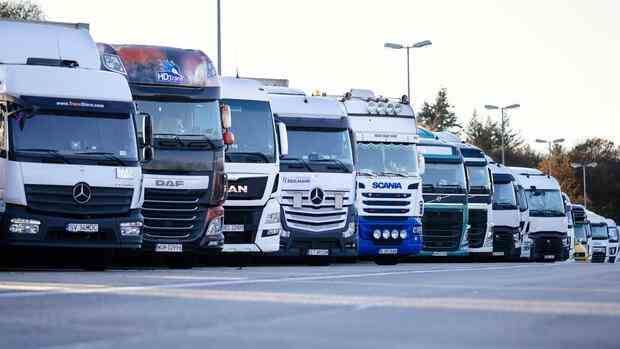Brussels In Europe, trucks and buses should no longer contribute to climate change with their emissions. The EU Commission intends to present a legislative proposal in the middle of the month that is intended to achieve this. A draft of this proposal is available to the Handelsblatt. This shows that the Commission wants to rely almost exclusively on electric drives powered by batteries or fuel cells.
E-fuels, on the other hand, with which conventional combustion engines can theoretically be operated in a climate-neutral manner, should not play a major role in normal traffic. The text states that the Commission has examined how renewable and low-carbon fuels could be taken into account. Various imputation models have been discussed in the industry.
However, the Commission now states: “However, the preferred option is not to include such a crediting mechanism, as this would not be cost-effective either for the manufacturers, for the operators and for society as a whole”. E-fuels are considered to be particularly inefficient. Furthermore, such mechanisms blurred the responsibilities of different actors towards the goal of climate neutrality and increased the administrative burden.
According to the Commission, e-fuels should only be used to operate vehicles that have already been registered in a more environmentally friendly way. New vehicles should be able to do without an internal combustion engine.
The alternative are electric motors that are either powered by electricity from a battery or by electricity from a fuel cell, which in turn uses hydrogen. Some truck manufacturers are also testing a combination of both.
No new combustion engines from 2040
The draft can still be changed before its presentation, which is scheduled for February 14th. In order for this to become law, majorities are needed in the European Parliament and in the Council of the EU Member States. Changes can also be made there.
The FDP had advocated having the EU Commission also examine the use of e-fuels for cars. The same is now threatening commercial vehicles.
(Photo: IMAGO/Mike Schmidt)
The text is intended to define in five-year steps how much the average emissions of all trucks and coaches from a manufacturer must decrease compared to the reference year 2019. The final stage should be reached in 2040. However, the corresponding percentages have not yet been entered in the document available to the Handelsblatt.
If the core of the draft is retained, the regulation for trucks and coaches would function in the same way as was decided for passenger cars last year. There, only under pressure from the German FDP, the work order for the EU Commission was included, according to which it should make proposals on how vehicles powered by e-fuels can continue to be approved.
This was preceded by a tough dispute within the federal government. It is foreseeable that this dispute could be repeated in relation to the new regulation.
>> Read here: Coalition agrees on a common position on the combustion engine off
On the other hand, different rules should apply to local buses. The average CO2 emissions of the vehicle fleet should not be decisive for them. Instead, the Commission wants to prescribe a share of zero-emission buses. The draft does not state how high this share should be and how quickly it should increase.
Given the technical maturity of the sub-sector and the need to improve urban air quality, a mandatory minimum share of new zero-emission city buses should be set. Draft by the EU Commission
City buses are easier to convert to electric drives than trucks and coaches because they travel at lower speeds and on the same routes, so the installation of charging stations and hydrogen filling stations can be aligned with this. In city traffic with many stops and acceleration processes, electric motors also have a particularly large advantage in terms of efficiency.
The Commission’s draft states: “Given the technical maturity of the sub-sector and the need to improve air quality in cities, a mandatory minimum share of new zero-emission city buses should be set.”
Manufacturers have not yet said goodbye to diesel
From the point of view of the industry, this is the lesser problem. Manufacturers are primarily concerned with whether enough hydrogen filling stations and charging stations will be available in good time. They are therefore putting pressure on the EU to make ambitious expansion targets with the planned regulation on the development of infrastructure for alternative fuels (Afir). However, some EU countries are opposed to this because they shy away from the costs.
Many truck manufacturers have announced that they will rely heavily on hydrogen and batteries in the future. So far, however, they do not want to say goodbye to diesel engines entirely.
The draft law lists the cases in which diesel engines should continue to be permitted: These are civil protection, the fire brigade, forces to maintain public order, armed security forces and emergency medical care.
More: Electric trucks are likely to be more profitable than combustion engines from 2030 onwards.
